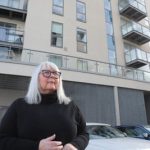If natural justice had its proper bearing, hundreds of thousands of people would not tonight be sleeping in high-rise homes that are clad in materials that could potentially go up in flames, a prospect for which they not only have to pay fire safety costs and higher insurance bills, but also face the reality that they will not be able to sell and move. Straight after the humanmade tragedy of the Grenfell fire of 2017, those flammable panels should have been stripped off flats across the land and families would be getting on with their lives. Instead of which, we have this week’s extended game of parliamentary ping pong between the House of Commons and the House of Lords, as they bat back and forth amendments to a fire safety bill amid a widespread sense of stasis.
Almost four years after 72 people died at Grenfell, we still have no reliable and regularly updated tally of how many buildings have serious fire safety defects. Instead, we have a smaller directory of buildings with Grenfell-style cladding. We have no official calculation of how much it will cost to make these buildings safe. Estimates put the total at £15bn; while the government has set aside a safety fund of only a third of that. That fund is off-limits to social housing providers, who must make do with a mere £400m between them. It is open only to private-sector blocks above 18 metres. Why a highly risky building of 17.5 metres doesn’t qualify, while a safer one of 18.5 metres does is a mystery, and a highly expensive one: the government estimates the cost to ineligible leaseholders could be up to £75,000 each.
Bills that size can push a family into financial ruin, and they are being forced on households who are in no way responsible for the safety defects of the buildings in which they live. All these people did was trust a system that failed them.
Also failing them is the Conservative government. In February, Boris Johnson pledged: “No leaseholder should have to pay for the unaffordable costs of fixing safety defects.” The prime minister is breaking yet another one of his promises.
It is galling to chuck £15bn of taxpayers’ money at fixing the work of property developers and their builders. But it is up to government to devise a way to finance the repair work and how to claw it back from a hugely profitable industry. Its best effort so far is a scheme to reclaim £2bn over the next decade.
Solutions to this are not simple, but they are obvious. First, Whitehall should publish which buildings are beset by what problems, how serious they are and how much they will cost to fix. Next, there needs to be a compact with mortgage lenders and with building insurers, to cover a greater proportion of homes. Finally, the government must accept that all leaseholders are blameless and should not be burdened with debt. Property developers should be compelled to pool together and fix the buildings. Those that don’t should be refused public sector work and named and shamed. If the Conservatives are serious about extending home ownership to more people, they need to be on the side of ordinary households, not property developers.



